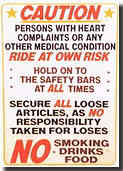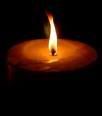Monday, October 27, 2008
On reading the first chapter of "No Death, No Fear"
An unfinished, unedited short essay from 2004, written for poet Jim Cohn, never sent. Too jumbled to complete, maybe there's a few worthwhile thoughts in it.
On reading a chapter of "No Death, No Fear," by Thich Nhat Hanh
When I say I am a scairdy cat, I am being jokey about something very serious. I have always been afraid. Afraid of what? Of abandonment, separation, of not being loved. Afraid of success, of failure, & of everything in between. Afraid of what I know & of what I do not know. Because I was born, I am afraid of dying.
Even the mild, humane Methodism in which I was raised did not explain why I was born; What it teaches about death has never made much sense to me. Eternal life is an oxymoron. Which leaves annihilation as the alternative; extinguished, snuffed out like a flame? A simile, like a flame. What is a flame? A flame is a passage for matter. It converts one kind of matter into a combination of energy & another kind of matter. So what does it mean to be extinguished like a flame?
I have thought about these things all of my adult life, & wondered about them in different ways as a child. Perhaps I was closer to understanding as a child, in rare moments of settledness, these moments almost always connected in some way with nature. I can still vividly recall the blooming, twisted magnolia next to the garage, a tree I could easily climb & be in the midst of colors & scent that intoxicated me. All the Jersey beaches of my life have been essentially the same beach, as contiguous to each other as this present moment is to other every present moment. The inlets that separate them are merely submerged beaches.
In the 80's I was a poet who went on to radio, & the more comfortable I became with the medium, the less poetry I featured on my programs. I realized that doing a free form radio was itself an art, with about the same rate of successes, of being fully in what I was creating; I was delighted by the absence of any resulting artifact, but for waves diffusing in space. During the 90's, I turned to prose, to the medium of the short newspaper essay, the "column." As with radio, I still considered myself a poet even as I made something other than a poem. I was aware of what I was doing & why. The poet tries in the making of poems to have as direct an experience as a dancer, a painter, a musician. An "audience" has a different kind of experience, also direct, but not the originator. It not a second hand experience, neither is it exactly first hand, as the artist experiences it. Knowing that the vast majority of literate Americans do not read poetry & do not know how to read poetry, why should my goal be to make them read my poetry? Or to concentrate upon audiences of other poets or captive audiences in classrooms? I wanted to point to the possibility of direct experience without the intermediary of poetry. Just look at it, do it, see it, hear it, & you might experience what poet experiences before the words go on to the paper. You will certainly become the dancer in your world. So I often wrote about what I had experienced in those places & events I had in common with readers, & simply tried to show them how easy it would be to experience it for themselves. I have rarely hesitated to use pieces of my poems in my prose if I thought it would help. I don't worry about stealing from myself if something I have written tries to manifest itself another way.
The irony here is that I often act without fear, & as a "teacher" (which I believe is on the path most poets take) my message has always contained, "Don't be afraid." But I was teaching to do as I say, not as I feel. For I am still trapped in the concepts, which I hope will not be understood by others as merely "concepts," but as "experiencing." I am afraid,
In the beautiful 14:5 of John's Gospel, Thomas asks Jesus, "Lord, we do not know where you are going; how can we know the way?" Jesus answers, "I am the way, and the truth, and the life; no one comes to the Father, but by me." Conservative Christians (mostly protestants at this point) interpret it to mean salvation is exclusive of all those who do not know of or believe in Jesus of Nazareth as the Christ. I wonder, what is this "way," who is this "I" & who is this "me" speaking at the small Passover gathering in the Upper Room. It is a voice I may have heard elsewhere, entering the world through the confines of human consciousness, into a particular culture, using the metaphors that are all we have to describe the indescribable? Is it understood out-of-context, a chapter that begins simply. "Do not let your hearts be troubled." The gentle message Thich Nhat Hanh brings from Buddhism.
Essay ends there. Yes I did read all of the book. If you ask Thich Nhat Hahn,"Where was Jesus before he was born?" he will ask, "Where was Jesus after he was born?"
"If a nation expects to be ignorant and free, in a state of civilization, it expects what never was and never will be." Thomas Jefferson
On reading a chapter of "No Death, No Fear," by Thich Nhat Hanh
When I say I am a scairdy cat, I am being jokey about something very serious. I have always been afraid. Afraid of what? Of abandonment, separation, of not being loved. Afraid of success, of failure, & of everything in between. Afraid of what I know & of what I do not know. Because I was born, I am afraid of dying.
Even the mild, humane Methodism in which I was raised did not explain why I was born; What it teaches about death has never made much sense to me. Eternal life is an oxymoron. Which leaves annihilation as the alternative; extinguished, snuffed out like a flame? A simile, like a flame. What is a flame? A flame is a passage for matter. It converts one kind of matter into a combination of energy & another kind of matter. So what does it mean to be extinguished like a flame?
I have thought about these things all of my adult life, & wondered about them in different ways as a child. Perhaps I was closer to understanding as a child, in rare moments of settledness, these moments almost always connected in some way with nature. I can still vividly recall the blooming, twisted magnolia next to the garage, a tree I could easily climb & be in the midst of colors & scent that intoxicated me. All the Jersey beaches of my life have been essentially the same beach, as contiguous to each other as this present moment is to other every present moment. The inlets that separate them are merely submerged beaches.
In the 80's I was a poet who went on to radio, & the more comfortable I became with the medium, the less poetry I featured on my programs. I realized that doing a free form radio was itself an art, with about the same rate of successes, of being fully in what I was creating; I was delighted by the absence of any resulting artifact, but for waves diffusing in space. During the 90's, I turned to prose, to the medium of the short newspaper essay, the "column." As with radio, I still considered myself a poet even as I made something other than a poem. I was aware of what I was doing & why. The poet tries in the making of poems to have as direct an experience as a dancer, a painter, a musician. An "audience" has a different kind of experience, also direct, but not the originator. It not a second hand experience, neither is it exactly first hand, as the artist experiences it. Knowing that the vast majority of literate Americans do not read poetry & do not know how to read poetry, why should my goal be to make them read my poetry? Or to concentrate upon audiences of other poets or captive audiences in classrooms? I wanted to point to the possibility of direct experience without the intermediary of poetry. Just look at it, do it, see it, hear it, & you might experience what poet experiences before the words go on to the paper. You will certainly become the dancer in your world. So I often wrote about what I had experienced in those places & events I had in common with readers, & simply tried to show them how easy it would be to experience it for themselves. I have rarely hesitated to use pieces of my poems in my prose if I thought it would help. I don't worry about stealing from myself if something I have written tries to manifest itself another way.
The irony here is that I often act without fear, & as a "teacher" (which I believe is on the path most poets take) my message has always contained, "Don't be afraid." But I was teaching to do as I say, not as I feel. For I am still trapped in the concepts, which I hope will not be understood by others as merely "concepts," but as "experiencing." I am afraid,
In the beautiful 14:5 of John's Gospel, Thomas asks Jesus, "Lord, we do not know where you are going; how can we know the way?" Jesus answers, "I am the way, and the truth, and the life; no one comes to the Father, but by me." Conservative Christians (mostly protestants at this point) interpret it to mean salvation is exclusive of all those who do not know of or believe in Jesus of Nazareth as the Christ. I wonder, what is this "way," who is this "I" & who is this "me" speaking at the small Passover gathering in the Upper Room. It is a voice I may have heard elsewhere, entering the world through the confines of human consciousness, into a particular culture, using the metaphors that are all we have to describe the indescribable? Is it understood out-of-context, a chapter that begins simply. "Do not let your hearts be troubled." The gentle message Thich Nhat Hanh brings from Buddhism.
Essay ends there. Yes I did read all of the book. If you ask Thich Nhat Hahn,"Where was Jesus before he was born?" he will ask, "Where was Jesus after he was born?"
Labels: about writing, blogging against theocracy, poem, religion














